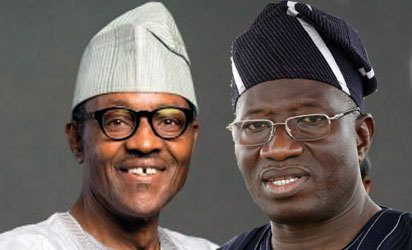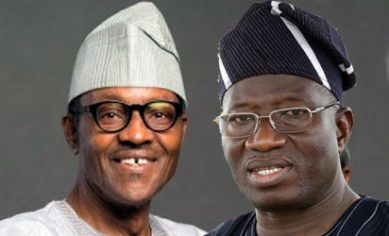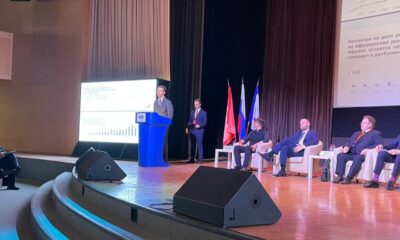National Issues
Probing all past and present crimes matter -By Seun Kolade

Nigerian presidential spokesperson, Femi Adesina, recently stated that the Buhari administration does not plan to extend his corruption probe beyond the immediate past administration of Goodluck Jonathan. Mr Adesina was at pains to remind us that, long before his inauguration, President Buhari had stated that “he will not waste time digging into the far past”. For good measure, he clarified that this “far past” includes the recent civilian administration of Obasanjo.
To say the least, this stance is problematic on several counts. Some have argued that the president does not want to be seen as a “probing president”, committing most of his energy and attention on scrutinising past administrations. The fundamental problem with this line of reasoning is the assumption that it is the president himself who has to oversee the investigations of corruption. There is already in place an agency, or a number of agencies, saddled with this responsibility. The Economic and Financial Crimes Commission (EFCC) may have been ineffective for many years, but what is needed is to revamp, reorganise and strengthen the organisation, and provide it with resources and institutional support to carry out its duties with the required effectiveness and efficiency.
Now, of course, it goes without saying for all practical purposes that the EFCC and similar agencies need to prioritise their activities and allocate resources accordingly. And in that respect, it is expected that urgent attention will be focused on more recent cases of corruption and the misappropriation of public funds. You can prioritise more recent cases of corruption and fraud, but that is no excuse to foreclose the possibility of the investigation of historic crimes. It is standard practice all over the world in civil and criminal matters that recent cases provide better opportunities of evidence gathering and better prospects of speedy and successful prosecution. Offenders have less time and opportunities to cover their tracks.
Having said that, it is against the fundamental principle of justice and equity to ignore and dismiss a crime because it was committed a long time ago. The present is connected with the past, and both have a bearing on the future. To use the example of Great Britain, recent evidence has emerged on historic crimes of the sexual abuse of minors in which the high and mighty in society were implicated. Some of those implicated are long dead, but investigations have been kept alive and some convictions have been made. Victims of historic abuse got reprieve and justice at last.
The Nigerian state has been a victim of the most savage abuse by pubic officials for decades. The commonwealth has been looted with recklessness, and the vast majority of the masses have reaped abject poverty and unmitigated misery in the process. What is more, those long standing abusers of the commonwealth are maintaining their relevance today precisely on account of their loot. Like the biblical King Adoni-besek, they have reduced fellow citizens to hapless beggars, feeding on crumbs under their bounteous table. In fact, the vast majority of citizens cannot even secure a place under the table for bony crumbs. They are shut out at the gate, languishing to death under the scotching heat of starvation and despair. For them the imperative of justice goes well over and beyond the concerns of vendetta and punishment of past offenders, it is a fight for basic humanity, a struggle to reclaim their dignity and take their rightful places as citizens with equal rights and opportunities.
Justice must be done however long it takes. As far as I am concerned, the big priority is for restitution, rather than punishment with, say, jail terms. Let the probe go as far as 1960. The relevant agencies should follow evidence where ever it leads, and bring offenders to book. Those who have enriched themselves at the expense of the long suffering public must return their loot, or have their assets sold to recover the loot. The Nigerian state-and the Nigerian people-has arguably suffered as much from capital flight as from terrorist violence and militant activities. It is as bad as that, if not more so. The vast amount of lost and dead capital could have been used to build infrastructure, raise productivity and generate high levels economic growth and human capital development. Tragically, this capital is in the hands of a few Nigerians and their foreign partners, to the detriment of the vast majority of their fellow country-folks.
Of course, there is no denying the fact that this is not an easy proposition. It is part of the weaknesses of the democratic process that past looters have used stolen assets to gain and maintain commanding influence at the highest levels of government. The legislative and executive arms of government, both at the state and national levels, are heavily populated by men and women of questionable records in public service. The good news is that this democratic process also has a great space, not available in dictatorships, for the effective exercise of citizens’ influence. This space is severely underdeveloped principally due to the lack of effective organisation by citizens. This fallow ground or virgin space presents the most auspicious opportunity for citizens to bring about real change. Recovering stolen loot and charting a new course for the future should be key parts of the agenda in the citizens’ clamour for real change.
It can happen. Yes it can.
Seun Kolade is a Postdoctoral Research Fellow at the Centre for African Entrepreneurship and Leadership, University of Wolverhampton, UK.


















